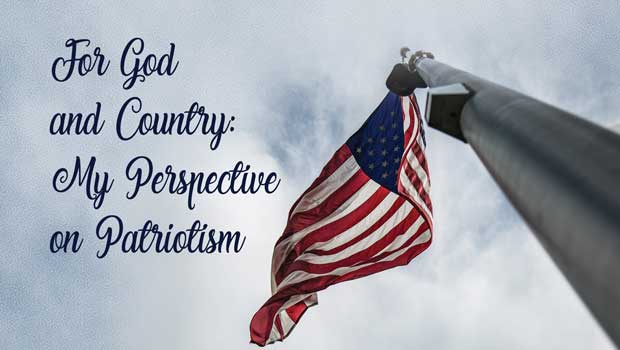I love Allah, and I love America. I love my religion, and I love my country. But can I have loyalties to both? Many Muslims in the U.S., including myself, have pondered this question.
It was something I thought deeply about when I accepted Islam while serving in the U.S. Army. A graduate of the United States Military Academy at West Point, I was an army officer. I worried that perhaps my military career was not Islamically permissible. At the time, U.S. involvement in the first Gulf War had just begun with Operation Desert Storm well on its way. Operation Desert Storm was the U.S. military mission staged in Saudi Arabia to oust Saddam Hussein and his Iraqi army from Kuwait in 1991. So naturally I was asking myself, “What if I am ordered to deploy to this conflict and find myself face-to-face fighting against Muslims from Iraq?” It’s not like I would have had a choice if given military orders — but what about my faith? I had learned that as a Muslim it is forbidden to kill another Muslim. If this is my religion, then how would it be possible for me to serve both God and country as an American Muslim soldier sent off to this war? It was a matter of conscience. I also wondered about Muslim soldiers from Saudi Arabia, Kuwait, and other Muslim countries in the U.S.-led coalition who were fighting alongside us. Would it be Islamically prohibited for them to fight in this war too since they were also Muslims fighting against Muslims? These questions were never satisfactorily answered.
I did later deploy to the combat zone in Saudi Arabia during Operation Desert Storm with an air defense artillery PATRIOT missiles unit. Alhamdulillah, I was never confronted with a situation where I might have had to take the life of, or even point a weapon at, another Muslim. In fact, this was true throughout the entirety of my military career. However, I’m certain this has not been the case for every Muslim American who has served or continues to serve in the U.S. military. Nevertheless, for those who are U.S. veterans or military service members, most other Americans will honor us as patriots, even though we are Muslim. Fellow citizens have thanked me “for [my] service” and called me a patriot. Going a bit further, we know that there are American Muslims who have, as they say, “paid the ultimate sacrifice,” having lost their lives while fighting for this country. Several of them who have been killed in the “War on Terror,” either in Afghanistan or Iraq, are buried at Arlington National Cemetery. Images of their grave markers can be seen on the internet. America will forever honor these Muslims as American patriots. But what is a patriot? What is patriotism?
Loving the Values and Freedoms of America
The American Heritage Dictionary defines patriotism as “love of and devotion to one’s country.” Patriotism comes in many forms and is often associated with things like fireworks on the Fourth of July, a barbecue on Memorial Day, or a parade on Veterans Day. One of the most visual signs associated with patriotism is flag waving. In the “Make America Great Again” socio-political climate, proud calls are made for massive deportation of ethnic minorities and widespread travel bans to prevent persons from six Muslim-majority countries from entering the United States. Many people have been emboldened to wave the red, white, and blue in support of these kinds of policies, policies that seemingly contradict American values. But is this flag waving patriotism?
America is supposed to be built on diversity, equality, liberty, and justice; the principle that “all me are created equal;” inclusion, not exclusion. The American way includes the freedom to speak your mind, the freedom to practice a religion, and the freedom to live the life you choose so long as it doesn’t break the law or infringe upon the rights of others. This is the America that I love, and this is the type of country I want to be devoted to. Loving these kinds of values, in my view, is patriotism. I would further argue that these American values run quite parallel to Islamic tradition, insomuch that when I uphold them I am also upholding my religion. In this way, I can love both God and country. I reject the notion that we should blindly love America just because it is our country, our team, some nationalistic rendering of “us vs. them.” Many wave the flag as a fanatic expression of American exceptionalism, losing any sense of what the ideal America is or what it should be, and they believe this to be patriotism.
Renouncing ‘My Tribe Right or Wrong’
During the time of Prophet Muhammad (peace be upon him), one of the prevailing issues was asabiyah or tribal partisanship. Khalid Griggs, the Imam of the Community Mosque of Winston-Salem in North Carolina, indicates that under asabiyah, adherence to tribal norms, mores, and taboos was unquestionable, to the degree that the operational social norm at the time was “my tribe right or wrong.” Prophet Muhammad (pbuh) spoke out against this type of overzealous tribalism saying, as recorded in Sahih Muslim, “Whosoever fights under the banner of the blind, becoming angry out of partisanship [asabiyah i.e., tribalism], calling towards it, or supporting it, and then dies, he dies a death of [a person in the days] of ignorance [jahiliyah].” The Sunan of Abu Dawood further documents Prophet Muhammad (pbuh) as saying, “He is not of us, the one who calls to partisanship; he is not of us, the one who fights for partisanship; and he is not of us, the one who dies by partisanship.”
Today, there are those who function with the same type of mentality: “My America right or wrong.” Are our public institutions to blame? In public schools, children are taught to ritually stand for the Pledge of Allegiance. As adults we are conditioned to do the same for the National Anthem. When standing for the Pledge of Allegiance, our pledge “to the flag” and “to the republic for which it stands” also asserts the principle “with liberty and justice for all.” Yet, as Americans, we should be free to choose not to stand for the national anthem or even to recite the Pledge of Allegiance. In fact, most state statutes stipulate that school children be given “the opportunity” to recite the pledge. Various wordings regarding providing the time to recite the pledge but not coercing students include “to voluntarily recite the pledge,” “for those students who wish to recite the pledge of allegiance,” “have a right not to participate in the pledge of allegiance,” “no student shall be compelled,” and “any student who wishes to be excused…shall be excused.”
Mandating or pressuring a citizen to stand for the Pledge of Allegiance is not liberty, not freedom, and not patriotism. However, not standing for the Pledge or for the national anthem is patriotic when it’s done to highlight the reality that our country is falling short of its ideals. Not standing in this situation is real patriotism because it’s done out of a love for America that demands that we, as citizens, recognize and rectify our nation’s shortcomings, and affect a path toward change. If people don’t stand simply because it is their individual right, religious or otherwise, to me the message here is also quite clear: they love America and they love the freedom guaranteed to its citizens. Wanting to deny individuals this freedom is the antithesis of patriotism.
Taking a Principled Stance for Justice
The controversy over NFL player Colin Kaepernick’s decision last year not to stand for the national anthem before games has taken the media and sports world by storm. Kaepernick chose to sit during the playing of the national anthem as his way of bringing attention to police brutality and the growing number of unarmed black men killed by police. Many of Kaepernick’s critics have scorned him as being unpatriotic. I disagree. His actions, which have drawn widespread support far beyond the world of sports, instead make him a patriot. His national anthem protest has further moved scores of athletes on other professional sports teams, as well as in colleges and high schools, to carry out similar types of social justice protests during the pre-game playing of the Star-Spangled Banner.
American Muslim and former NBA player Mahmoud Abdul-Raouf created a similar controversy in 1996 when he refused to participate in the pre-game national anthem ceremony in protest over the role he sees America playing in global tyranny and oppression. While speaking publicly in Harlem recently, Abdul-Raouf stated that he uses the platform that Allah has given him to speak his conscience. In doing so, he continues to be critical of U.S. foreign policy in his fight for global justice, and encourages fellow citizens to represent what they themselves believe in. Academic historian Howard Zinn once noted in an interview, “While some people think that dissent is unpatriotic, I would argue that dissent is the highest form of patriotism. In fact, if patriotism means being true to the principles for which your country is supposed to stand, then certainly the right to dissent is one of those principles. And if we’re exercising that right to dissent, it’s a patriotic act.” It is in this light that I view both Mahmoud Abdul-Raouf and Colin Kaepernick.
As Muslims, we too must act or speak out when we see something wrong. Prophet Muhammad (pbuh) said, “Whoever of you sees an evil must then change it with his hand. If he is not able to do so, then [he must change it] with his tongue. And if he is not able to do so, then [he must change it] with his heart. And that is the slightest [effect of] faith” (Muslim). Furthermore, Allah says in Quran, “O you who believe! Stand out firmly for justice, as witnesses to Allah…” (4:135).
Islam requires us to take a principled stance for justice, and when we do we are being faithful to Allah and His commands. If our stand means we must be critical of American wrongdoing, then it is out of love and loyalty to the country and to its people who deserve better. Patriotism is not flag waving in blind support of your country, but it is engaging yourself in that which makes that flag deserving of being waved.
James “Yusuf” Yee is a former U.S. Army officer who served as the Muslim chaplain at the U.S military prison camp at Guantanamo Bay. The views and opinions expressed in this article are those of the author and do not necessarily reflect the views or ideological position of The Message International.





